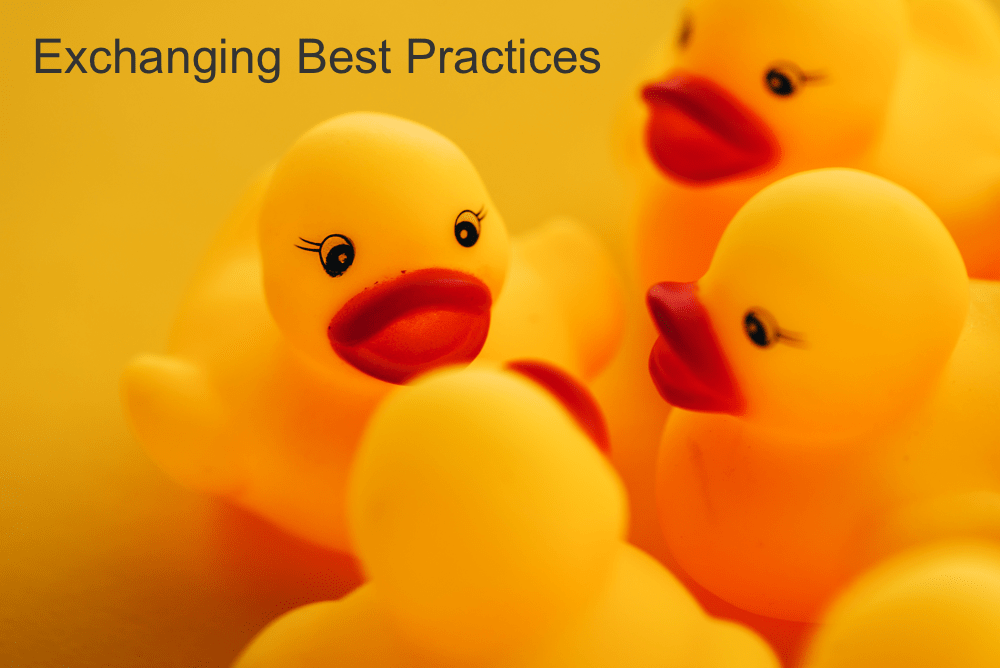The rubber duck image is inspired by a software development “best practice” of sharing difficult problems with a rubber duck. The act of explaining brings clarity and so this technique accelerates software debug. It also follows that a rubber duck learns many best practices over the course of its career …
I recently setup a Best Practices Exchange (BPXchange) as an experiment in learning through sharing for busy Engineering Team Leaders working in different companies. The I recently setup a Best Practices Exchange (BPXchange) as an experiment in learning through sharing for busy Engineering Team Leaders working in different companies.challenge was to find a format that would allow added-value exchanges in a reasonable time, taking into account the logistics of scheduling and hosting the virtual meeting, the selection of topics and the facilitation of the exchange.
And we did it! The first BPXchanges worked like magic!
So, if you’re interested in participating in future sessions, please go to this page.
What follows is a short account of our experience so far …
Three two-hour teleconferences were setup using a simple calendar invitation mechanism, with an upper limit of five participants per session. Two of the three sessions were in English, one was in French and all three were sell-outs – we ended up with six participants in each session.
The process improved a little each time and, in particular, we learnt how to use the time together to think of topics for future sessions. In fact, one of the most important learning points from the exercise was that it’s critical to get the right the balance between spontaneity (being able to bring up new topics at the beginning of a session) and preparation (having the chance to prepare for the discussion of a topic prior to a session).
The exchanges themselves were much more than just discussion. We adapted the approach to each topic according to its characteristics and the needs of its proponent. For example, some topics were requests for advice, others were offers of experience sharing and some topics were presentations that their owners wanted to get feedback on. By taking the right approach to each subject, we increased the value of the exchange and optimised the time spent on it.
You’ll see from the comments below that participants were pleasantly surprised by what they learnt from peers working in quite different areas of industry. The 18 participants for the three sessions came from 9 countries and 12 different companies, ranging from the giants (e.g. Teledyne, STMicroelectronics) through mid-sized organisations (e.g. Synopsys, EM Microelectronics, Axcelis) to SMEs (e.g. Hyperstone, Codasip, Oritur). Even in the companies that fielded multiple participants, all these people were from different sites and did not know each other. So it was quite a mix!
Here’s some data from the session feedback forms and topic boards:
- 89%: It was easy for me to register and join
- 91%: I liked the way in which the session was facilitated:
- 93%: I enjoyed the session
- 82%: I learnt something useful from the session
- 78%: The information received after the session was valuable
- 89%: I feel motivated to join a future session
“Open minded discussion. Interesting to get different background and viewpoints. Dynamic round table. The different topics were well organised, leaving flexibility for live adaptation.”
“The challenge is to talk to people you have never met before. I was surprised to see how well it went.”
“I liked the diversity of the different background and experiences, even if sometimes far from my own. Very good agenda and time keeping. Also, the meeting was very well prepared but not too much, giving spontaneity to our participation.”
“… Good to have notes from the discussion after the session. Will be happy to participate – each semester, once a year? – to a real discussion around a glass of wine, in an appropriate location, …”
Examples of topics that came up (not all have been dealt with yet) …
- I suck at management. Not interested in people mgmt (perf reviews, etc…) but would like techniques/pointers/exp in effectively manage project milestones & deliverables. I can manage my own very well, but a team’s, not so much.
- My company just introduced MS teams to everyone. It’s pretty much like Slack. How do we structure communications to take advantage of the #channel medium, vs emails, vs formal docs?
- Forecasting (development projects and financial – it was interesting to compare the issues and techniques)
- Requesting suggestions on what to include in a comprehensive and compelling business plan.
- Exchange of case studies or examples of agile planning in real situations (ideally using JIRA as the database). Related to this, lean product development and agile methodologies.
- Sharing ideas on how to balance technical knowledge (great engineers) with the intangible knowledge (great managers).
- Feedback on my presentation please: subject = creating a creative & innovative environment
- Offer to share experience on prioritising R&D projects
- Managing dashboard systems for monitoring team tasks
- Advice needed on what to do when there is a big gap between what a team wants to do and what the client needs them to do!
Again, if you’re interested in participating in future sessions, please go to this page.

